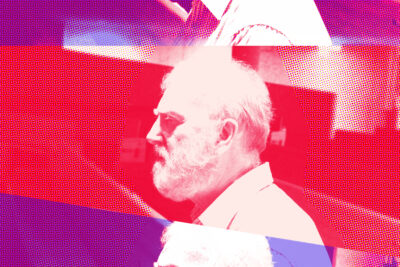
Dominic Barberi, the ‘saint’ attacked on England’s streets
Father Dominic Barberi is remembered by many Catholics simply as the priest who received Saint John Henry Newman into the Church. But he was far more than that: during Dominic’s Mass of beatification on October 27, 1963, Pope Paul VI noted that he had “more than one claim to outstanding merit”: that he was a theologian, a philosopher, and had anticipated elements of the First Vatican Council.
Years earlier, in 1926, Cardinal Francis Bourne of Westminster had been even more effusive. “Of all the preachers of the divine Word who have worked for the salvation of souls in England,” the cardinal wrote, “there is no one, in our opinion, to whom we are more indebted than the Servant of God, Dominic of the Mother of God. I should consider myself happy if I had the power and right to dedicate this whole diocese to his care and protection, and be allowed to honour him as our patron and protector of England.”
So why has Dominic been so celebrated, and by Passionists in particular?
First of all, in his relationship with John Henry Newman, Dominic was more than a functionary: their meeting at Littlemore, Oxfordshire, in October 1845, may perhaps be only a small part of his story, but it is important nevertheless.
Newman himself tells us that he entered the Catholic Church precisely at that moment because of the supernatural qualities he recognised instantly in the Italian missionary. “When his form came into sight, I was moved to the depths in the strangest way,” he wrote years later. “His very look had about it something holy.” Church scholars today acknowledge that the sanctity of Blessed Dominic confirmed for Newman what he had come to believe intellectually about the Catholic faith.
This brings us to our own times and to the challenge of what is described as the “new evangelisation”, the project of preaching the Gospel afresh to the people of our very modern age.
It is surely no accident that Dominic Barberi was beatified during the Second Vatican Council. One of the Council’s themes was to prepare the Church for effective mission in the modern world, as noted by Archbishop Bernard Longley of Birmingham, during a recent Mass at Dominic’s tomb in St Helens. Archbishop Longley said that Blessed Dominic provides us with a great model for such mission. For that reason he was named by the archdiocese as a patron of the Year of Faith, inaugurated to mark the 50th anniversary of the Council.
Blessed Dominic’s example first and foremost represents a call to holiness. It is this witness of life, this experience of goodness, that attracts people to Christ above all else. For us, it means interior conversion, a theme constantly proposed by Pope Francis: to heal, to bring Christ to others, we must ourselves first be holy.
When considering Blessed Dominic of the Mother of God certain elements are essential to keep in mind. He cannot be understood outside of his interior life, which was formed as a Passionist, a religious congregation founded by St Paul of the Cross to keep alive the memory of the Passion of Jesus Christ, “the most overwhelming act of God’s love”.
Passionists have at the heart of their spirituality a loving memory of the Crucified Christ, by which is meant meditation on the love and mercy of God. God so loved the world that he sent his only Son, not just to be among us but to take the form of a slave and die a brutal death at the hands of the Roman Empire. In this way God’s glory and our hope have been given.
Dominic was steeped in this tradition. The apostolic outlook of a Passionist is very much to see the Crucified God in His Crucified Ones – that is, to see the face of the suffering Christ wherever humanity suffers, and to respond to this in love and mercy. Dominic had first hand experience
of the effects of war and of religious persecution, and of personal loss. He was only a child when his parents died and he was a young man when Napoleon invaded Italy, among other things suppressing the religious orders.
When Dominic arrived in England he found a country undergoing rapid industrialisation, with large-scale movements of people and desperate living conditions. He saw the effects of urban poverty up close.
A vestigial hatred of the Catholic faith was also a problem, and Dominic endured insults and even physical attacks as he walked the streets in his Passionist attire. But he did not see non-Catholics as “the enemy”. Rather, he approached all people with the deepest respect and reverence. Like his contemporary Passionists, Fr Ignatius Spencer and Sister Elizabeth Prout, Dominic reached out a hand of friendship and dialogue to non-Catholics. This was not always the attitude at the time.
The Second Vatican Council expressed in the official teaching of the Church that all Christians and all peoples of other faiths are children of God, and that we reject nothing of what is good and true in them, wherever it is to be found. Dominic was indeed a man ahead of his time.
These aspects of Dominic’s life show that he is very contemporary. In a world that continues to see war and violence, where religion is fatally distorted by some, where many no longer even know what “the Passion of Christ” means, let alone honour this as they should, the values of Dominic’s life and the things that were important to him are as vital today as they were then.
On October 27, Passionists from all over the world gathered at the Church of St Anne and Blessed Dominic for a Mass celebrated in sight of Dominic’s tomb by the Most Rev Joachim Rego, the Superior General of the Passionist order. The occasion was the 50th anniversary of the beatification of Blessed Dominic by a pope who famously said that “the Church exists to evangelise”. Our prayers for Blessed Dominic’s canonisation will be intense and I invite you to join us in asking God for the second miracle required to recognise this great man as a saint. Blessed Dominic Barberi, pray for us.
Related Stories

Inner State: Passionist Life in North Belfast
North Belfast is a community that has seen immense trauma over the past century – defined by political forces beyond its control.
May 30 2024

To Illumine the Mind: the Catholic diaspora in Paris
In Paris, Martin Coffey leads a church overflowing with working class immigrants. The picture of religion in France, he tells us, is not what you think.
Mar 01 2024

Positive Faith present a World Aids Day service, ‘The Reason for Hope’
Reflections, music and scripture as well as opportunities for sharing on this World Aids Day online service.
Dec 01 2023
